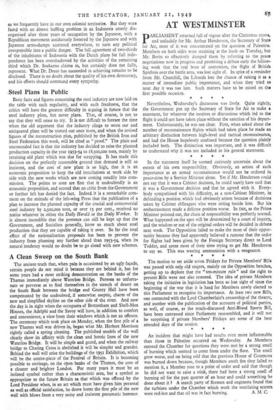AT WESTMINSTER
pARLIAMENT returned full of vigour after the Christmas recess, and unluckily for Mr. Arthur Henderson, the Secretary of State for Air, most of it was concentrated on the question of Palestine. Members on both sides were straining at the leash on Tuesday, but Mr. Bevin so effectively damped them by referring to the peace negotiations now in progress and promising a debate early the follow- ing week that the real bone of contention, the flight of British Spitfires over the battle area, was lost sight of. In spite of a reminder from Mr. Churchill, the Liberals lost the chance of raising it at a matter of immediate public importance, and when they tried to next day it was too late. Such matters have to be raised on the
first possible occasion. * * Nevertheless, Wednesday's discussion was lively. Quite rightly, the Government put up the Secretary of State for Air to make a statement, for whatever the motives or discussions which led to the flight it could not have taken place without the sanction of his depart- ment. Unfortunately, he was not clear. First, when asked about the number of reconnaissance flights which had taken place he made an arbitrary distinction between high-level and tactical reconnaissance, and had the House hopelessly confused because the question plainly included both. The distinction was important, and it was difficult to understand why it was not included in his general statement.
* * In the statement itself he seemed curiously uncertain about the extent of his own responsibility. Obviously, an action of such importance as an armed reconnaissance would not be ordered in peace-time by a Service Minister alone. Yet if Mr. Henderson could not say that it was a Cabinet decision, he could surely have said that it was a Government decision and that he agreed with it. Every- body sympathised with his difficulty, as a non-Cabinet Minister, in defending a position which had obviously arisen because of decisions taken by Cabinet colleagues who were sitting beside him. But his embarrassment made a delicate position worse. In fact, as the Prime Minister pointed out, the chain of responsibility was perfectly normal. What happened on the spot will be determined by a court of inquiry, and the wisdom or not of the original orders will be decided in debate next week. The Opposition failed to make the most of their oppor- tunity because they had apparently believed a rumour that the order for flights had been given by the Foreign Secretary direct to Lord Tedder, and spent most of their time trying to get Mr. Henderson to say so. This was wasting ammunition with a vengeance. * * * * The motion to set aside seven Fridays for Private Members' Bills was passed with only old stagers, mainly on the Opposition benches, getting up to deplore that the " ten-minute rule " and the right to present Bills were not also restored. The idea of private Members taking the initiative in legislation has been so lost sight of since the beginning of the war that it is hard for Members newly elected to this Parliament to recognise its importance. At least two new Bills, one connected with the Lord Chamberlain's censorship of the theatre, and another with the publication of the accounts of political parties, as well, of course, as the much-discussed Anti-Blood Sports Bill, have been canvassed since Parliament reassembled, and it will not be surprising if private Members' Fridays are some of the best attended days of the session. * * An incident that might have had results even more inflammable than those in Palestine occurred on Wednesday. As Members entered the Chamber for questions they were met by a strong smell of burning which seemed to come from under the floor. The smell grew worse, and on being told that the previous House of Commons was burned down because, though Members smelt fire they failed to mention it, a Member rose to a point of order and said that though he did not want to raise a stink, there had been a strong smell of burning oil for the past quarter of an hour and could something be done about it ? A search party of firemen and engineers found that the turbines under the Chamber which work the ventilating system were red-hot and that oil was in fact burning. A. M. C.






































 Previous page
Previous page